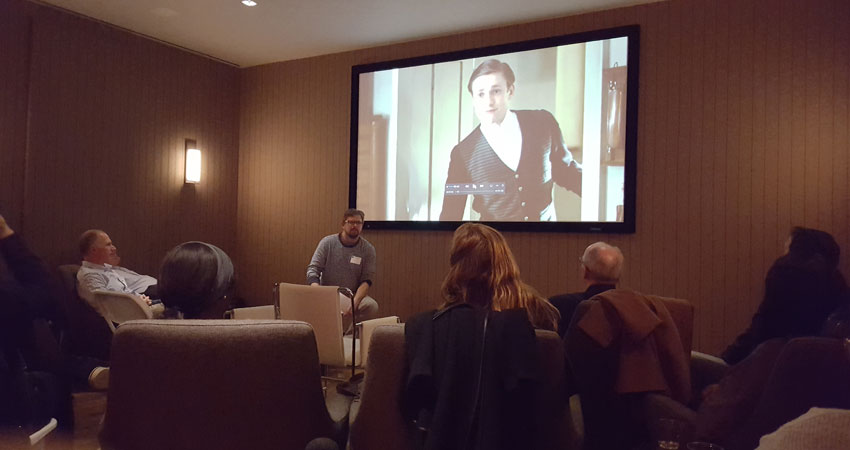Salon with Caleb Brown
by Matt Allen
Christian Union New York adopted a new format for their latest salon on March 26, 2019, when they invited guest speaker Caleb Brown to speak on the topic How (And How Not) to Watch a Movie. Rather than the usual lecture followed by Q&A format, Brown led a room of nearly thirty attendees through the pilot episode of Downton Abbey, taking regular pauses to point to the expertly crafted use of camera-angles, iconography, and audio that casual viewers (i.e. the majority of us) rarely pick up on. A short but lively discussion followed.
Partial Audio Recording

This lesson was important partly because the majority of us don’t recognize the technical skill that goes into creating an excellent film or TV series. Excellence in this field doesn’t just depend on a great script and talented actors. As with any art form, there are multiple layers and minute details that go into creating an excellent movie, and it takes expertise to see beneath the surface and fully appreciate the carefully crafted details that went into its writing, filming, and editing.
For example, Brown pointed out that while most of us think that films are an entirely visual media, the emotions you are made to feel are mostly generated by the audio used. During the scene in Downton Abbey where we are introduced to Lord Grantham, the patriarch of the Crawley family and co-owner of the manor, the warm music in the background as he quietly descends the stairs tells you that he is a good man, before he has said a word. Furthermore, his dignified descent down the stairs is in fact a picture of the story behind the entire show—the aristocracy trying to maintain grace and dignity during its steady decline in Britain.

Beyond being taught how to more fully appreciate the artistry of film production, however, Brown also emphasized the importance of engaging movies with greater discernment. “The job of directors is to manipulate your attention,” said Brown, “You need to be able to detect what they’re doing and decide whether it’s a good thing or not.” With so much of the story being told through beneath-the-surface techniques, we need to be cognizant of the lessons we are being taught and the ways we are being made to feel about certain themes, people and messages, and determine whether they line up with the truth of the gospel.
Closing his talk, Brown proposed that “In sum, a Christian film is a film that tells the truth.” If a movie points you to truth and engages with the real world and real emotion in a way that highlights the power of redemption, sacrifice, justice and other gospel themes, we ought to celebrate that. As we read in Philppians 4:8, “whatever is true, whatever is honorable, whatever is just, whatever is pure, whatever is lovely, whatever is commendable, if there is any excellence, if there is anything worthy of praise, think about these things.” For Brown, we ought not engage with movies that distort the truth and violate what is honorable, just, and pure, but rather than rejecting all secular media, if they tell a story that is lovely, commendable, and worthy of praise, we can engage with and celebrate such works for the Truth they contain, whether made by Christians or not.
Get Involved
If you would like to learn more or to get involved with CU New York, please email: cunewyork@christianunion.com.


